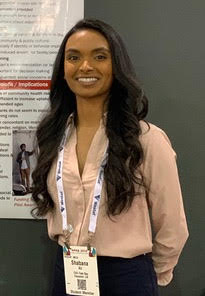A solid internship can be a major turning point for a student’s career journey. Shabana Ali, age 23, knows this well. She is grateful to have experienced that kind of internship at Alameda County Behavioral Health (ACBH) in summer 2019.
“I really liked it because it was different than some of the other internships that I’ve had in the past,” said Shabana, a senior majoring in public health at CSU East Bay.
Shabana’s big summer assignment was to create online career surveys for high school and undergraduate college students who have participated in one of Behavioral Health Care’s career exploration activities or internships within the past five years
“The surveys asked them what their interests were, if they were still interested in the behavioral health field, what challenges, or struggles they were facing, and what kinds of supports they would need to reach their career goals,” she explained.
Taking on this task excited Shabana because she enjoys working as a research assistant on her campus. Shabana interned for the Workforce Development, Education and Training (WET). WET works to ensure that ACBH’S workforce is diverse, multilingual and culturally competent so that they’re able to serve the county’s multicultural population. WET partnered on the career follow-up survey with FACES for the Future. FACES mentors’ youth from disadvantaged groups into health careers. The collaborators’ trust in her decisions empowered Shabana.
“They allowed me to make decisions on my own and gave me the freedom to take control,” she says enthusiastically. That experience helped me to be more confident collaborating with programs as a researcher”.
The data Shabana collected will help ACBH and their partners create future programs tailored to aid teens in career pathways programs who are aspiring to be healthcare professionals. They have a lot in common with Shabana, which makes the project even more significant for her.
“I thought it was awesome, especially as a first-generation college student, because it can be really difficult navigating the system,” she said.
Shabana also researched and designed a resource guide for ACBH staff and community providers that include a wide variety of behavioral health services in the Alameda County.
Shabana contributed to the community through her internship but she says she gained a lot as well. She made professional connections, and attended career conferences. She learned even more about mental health directly from mental health consumers at the annual POCC (Pool of Consumer Champion) Conference. The POCC is an active peer-run, grass roots group of consumers that provides a point of connection, engagement, and a strong voice for consumers in the mental health system and in the community. It is run by ACBH’s Consumer Empowerment Team. “That program specifically has helped a lot of people feel like they belong”, says Shabana. The conference attendees were welcoming, and being around people from the community enlightened her.
She witnessed this kind of peer-to-peer support outside of the POCC when attending a criminal justice training on how some formerly-incarcerated people struggle with mental health issues. Shabana listened to one man who served over 20 years in prison. “It’s hard for them to get back into the system because they’ve been gone for so long,” she said. “Something that I learned about mental health is that there’s a lot of stigma behind it, but people are actually really trying to improve.”
Thanks to funding from the Mental Health Services Act, students like Shabana can work in internships that will help prepare them for careers in the mental health field, and beyond.
After finishing college, Shabana Ali will pursue a master’s degree in public health. She wants to work with mothers and children, research health disparities in the Indo-Fijian community, and educate Indo-Fijians about mental health. Shabana’s Alameda County Behavioral Health internship gave her valuable work experience and mentorship. However, there’s another important lesson she took away when it comes to supporting consumers – hope.
“It was really great to see that there’s always going to be people to help them out, who are empathetic,” she said. “It gives you a lot of hope.”


